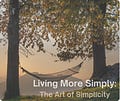Living more simply for most of us will remain an unrealized dream until we face the overaccumulation and clutter crisis marking our lives and homes. Here are a few data points that stop you in your tracks as you consider the excesses of the American dream:
The average American home has 300,000 items (LA Times)
One out of four American homes with a two-car garage has so much stuff in the garage that a single car can’t be parked in the garage. Another one-third of homes with two-car garages can only park one car in it. (U. S. Department of Energy)
On average, every American discards 68 pounds of clothing every year (Huffington Post)
Americans spend $1.2 trillion annually on nonessential items (Wall Street Journal)
Self-storage business is big business! In 1984, there were 6,600 self-storage buildings in the U. S. Today, there 52,300 self-storage buildings.
How Did We Accumulate So Much Stuff?
Several factors have contributed to our overaccumulation and clutter problem. Here are a few common contributing issues:
We overaccumulate because we can—and it’s never been easier. Shopping is five feet away on our smart phone or tablet. With the help of “1-Click Shopping” and same-day delivery, we have stuff before we can even think whether we really need it.
We overaccumulate because it’s sneaky. Who can pass up the “buy two and get the third free" deal? Almost before we know it, the dining table is covered with stuff, excess food spills out from one refrigerator/freezer to a second refrigerator and freezer, crates are filled and stuffed under beds, we pack unused rooms with stuff and close doors when people come over, and garages become secondary self-storage units.
We overaccumulate because our economy has made overconsumption a way of life. The greatest money culture the world has ever seen needs people to upgrade constantly to more consumption. To achieve that goal, marketing has been unleashed on our psyches and spirits, attaching our purchasing not to what we need but to spiritual, emotional, and ego satisfaction.
We overaccumulate for a host of emotional issues: anxiety, stress, lack of self-worth, and a sense of spiritual emptiness, to name a few. We hold onto stuff because we’re sentimental, indecisive, overwhelmed, embarrassed—and maybe we’ll need it someday in the future.
I sense, and appreciate, your hunger for a deeper life with Jesus! The Compass Spiritual Formation Newsletter aims to mark the path to that deeper life. Join for a free subscription to stay updated and keep the journey moving ahead. A paid subscription will unlock more resources for exploring a deeper life with Jesus.
A Personal Story
My wife has owned a business focused on organizational space design. She has assisted individuals, families, universities, and businesses in replacing cluttered spaces with more open, spacious, and beautiful living and work spaces. I’m always fascinated by the methods she employs to assist a client in transitioning from overaccumulation to a more open and potentially minimalist environment. I have enjoyed the before-and-after stories, felt the struggles of her clients, and envisioned the transformation from crowded and cluttered spaces to something more open and spacious — until she directed her talents towards my library!
We were in the middle of reducing our living space by approximately 700 square feet. Books I had carried with me for years were not going to fit into our new space. I made an effort to shift focus away from my library to other things for which I felt less emotionally attachment. However, none of my cunning plans succeeded. My wife had heard it all before—and she was ready! Before I realized it, she had unveiled her three famous tarps, each in a distinct color. My task was straightforward: on the red tarp, put all the books I hadn't read in years, had no intention of reading again, and had no justification for keeping. The green tarp was designated for books I appreciated but likely would not revisit. The blue tarp was designated for books I cherished, had read multiple times, would revisit, or were by an author who held significance for me. With the downsize mandate issued, my wife closed the door, and I set off to work. Two hours later, the blue tarp was stacked with books, the green tarp held a couple of dozen, and the red tarp contained just three books.
After two hours, my wife opened the door, glanced at me, shook her head, said, “Not going to happen,” and closed the door. Ultimately, I found freedom from overaccumulation. Gathering crates of books to donate to a nearby college library and to a local thrift store, allowing others to benefit from them, brought a true sense of liberation and relief.
I’m curious about your story of grappling with overaccumulation and the struggle to a simpler, freer life. What would you share that would help and encourage us?
Discovering a path to a simpler life involves exercises such as the “three tarps.” Numerous resources exist that offer valuable advice and strategies to assist in creating exterior environments that feel more open, expansive, and spacious. However, eventually, we will need to cross a boundary to access the interior world and seek liberation from the fundamental spiritual and emotional elements that triggered overaccumulation. But that’s an article for another day.
At times, the journey to a simpler life can appear overwhelming. Reflecting on my struggle in the library with my own three tarps, I understand. But Jesus presents a captivating and persuasive vision of what can be when we embrace our deep and persistent longing for a simpler, quieter, and slower life:
“Look at the birds, free and unfettered…” (Matthew 6:26)
Without finishing the sentence, we know what he means: that could be us!



